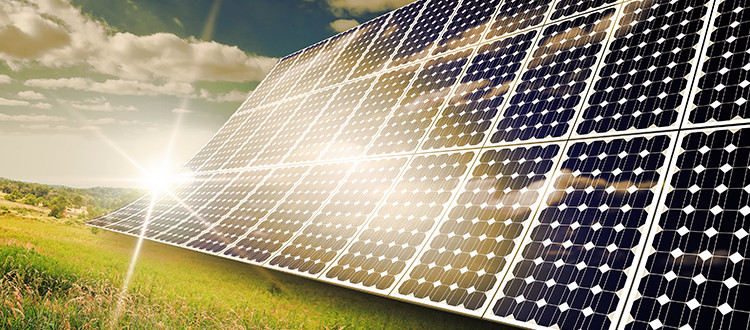Solar energy is an increasingly important renewable energy source in today’s world. It is a clean and abundant source of energy that can help reduce our dependence on finite fossil fuels and help mitigate the impacts of climate change. Why is Solar Energy Important? Delve into the fascinating world of solar power and uncover its vital role in building a sustainable future. Join us as we explore the benefits of solar energy and its impact on the environment. Let’s get started!
Solar Energy: What Is It?
The sun’s energy is referred to as solar energy. This energy can be captured and transformed into electricity through the use of solar panels. The process works by absorbing the sun’s rays through photovoltaic cells, which then convert the energy into electrical current. This electrical current can then be stored in batteries or used immediately to power homes and businesses.
Unveil the mystery behind solar energy! Click here to discover how solar panels work and how they power up your home while helping the planet.
Why Is Solar Energy Important?
Solar energy is important for many reasons, including environmental benefits, economic benefits, technological advancements, increased access to electricity, and more. In the following sections, we will explore each of these benefits in more detail.
Environmental Benefits
- Reduction of Greenhouse Gas Emissions: One of the key environmental benefits of solar energy is its ability to reduce greenhouse gas emissions. When burned, fossil fuels like coal, oil, and natural gas release carbon dioxide, contributing to climate change and global warming. However, solar power is clean and sustainable because it doesn’t contribute to global warming. Solar energy has the potential to minimize our carbon footprint and lessen the effects of climate change if we switch from fossil fuels.
- Clean Energy Source: The use of solar energy is environmentally friendly because it does not create any hazardous byproducts or pollutants. Using fossil fuels, on the other hand, has a directly opposite effect by contributing to the emission of toxic pollutants like nitrogen oxides, sulfur dioxide, and particulate matter, which can have a detrimental effect on air and water quality.
- Protection of Natural Resources: Solar energy also helps to protect natural resources. Fossil fuels are finite resources, meaning that they will eventually run out. This creates a need for us to find alternative sources of energy that are sustainable and renewable. Solar energy fits this bill, as the sun provides an abundance of energy that can be harnessed and used to power our homes and businesses. By transitioning to solar energy, we can help preserve our natural resources and reduce the need for finite fossil fuels.
Economic Benefits
- Cost Savings: One of the key economic benefits of solar energy is cost savings. Inexpensive solar panels have become increasingly viable for residential and commercial use in recent years. In addition, once installed, solar panels require little maintenance, meaning homeowners and businesses can enjoy lower energy bills for years.
- Job Creation: Solar energy also provides an opportunity for job creation. As the demand for solar energy increases, more jobs will be created in designing, installing, and maintaining solar panels. This can help boost local economies and provide new job opportunities for people in communities all across the country.
- Increased Energy Independence: Solar energy allows homeowners and businesses to generate their own electricity, reducing their reliance on the electrical grid and making them less dependent on fossil fuels. This increased energy independence can help to reduce energy costs and make communities more resilient in the face of power outages or other disruptions.
- Increased Property Value: Homes and businesses with installed solar panels often have increased property values, making them more attractive to potential buyers.
- Reduced Energy Costs for Low-Income Households: Low-income households can benefit from solar energy by reducing their energy costs, making it easier for them to meet their basic needs. This can help bridge the energy gap and improve the quality of life for those struggling to make ends meet.
- Improved Energy Security: By relying on renewable energy sources such as solar, countries can reduce their dependence on foreign sources of fossil fuels, increasing energy security and reducing the risk of energy price spikes.
Ready to make the switch to solar? Click here to explore the different types of solar panels available and find the perfect fit for your home and budget.
Technological Advancements in Solar Energy
The development of new and improved technology has greatly impacted the growth and popularity of solar energy. Here are some of the key technological advancements in solar energy and their benefits:
- Improved Efficiency: One of the biggest advancements in solar technology has been the increase in the efficiency of solar panels. Newer panels can convert more of the sun’s energy into usable electricity, making them more cost-effective and reducing the amount of space required for installation.
- Increased Durability: Newer solar panels are designed to be more durable and withstand harsh weather conditions, such as high winds, hail, and heavy rain. This means that they are less likely to be damaged and will have a longer lifespan, reducing the need for maintenance and replacements.
- Better Energy Storage: Technological advancements have led to the development of better energy storage solutions, such as batteries, which can store excess energy generated by solar panels for use during times when the sun is not shining. This allows for greater energy independence and reduces reliance on the electrical grid.
- More Affordable: The cost of solar panels and installation has decreased significantly recently, making solar energy more accessible and affordable for households and businesses. This has encouraged greater adoption of solar energy and has helped to make it a more viable alternative to traditional energy sources.
- Advanced Monitoring Systems: The use of advanced monitoring systems, such as inverters and monitoring software, makes it easier to track and manage the performance of solar panels. This allows for real-time monitoring of energy production and can help to identify any issues or problems, making it easier to resolve them quickly.
- Increased Flexibility: Advances in technology have also led to the development of more flexible and versatile solar panels, which can be integrated into various applications, including roofing materials, portable panels, and even wearable technology.

Increased Access to Electricity through Solar Energy
Solar energy has the potential to bring electricity to be remote and underserved communities, providing greater access to energy and improving the quality of life for people all over the world. Here are some of how solar energy can increase access to electricity:
- Rural Areas: Many rural communities lack access to the electrical grid, making it difficult for residents to power their homes and businesses. Solar energy offers a solution, allowing residents to generate their own electricity and reducing their dependence on diesel generators or other expensive and polluting energy sources.
- Developing Countries: In many developing countries, large segments of the population lack access to electricity, which can impede economic growth and limit access to basic services such as healthcare and education. Solar energy offers a cost-effective and sustainable solution, allowing these communities to generate their own electricity and improve their quality of life.
- Emergency Situations: Communities may lose electricity if natural disasters or other situations damage the electrical grid. Solar energy can provide a source of emergency power, ensuring that critical services such as hospitals and communication networks can continue operating even without grid power.
- Off-Grid Communities: Some communities are located in areas where it is not economically viable to extend the electrical grid, leaving residents without access to power. Solar energy allows these communities to produce their own electricity as an alternative to costly and harmful fossil fuels.
- Remote Areas: In remote areas, such as deserts, mountains, or islands, extending the electrical grid can be challenging, making it difficult for residents to access electricity. Solar energy offers a solution, providing residents with a renewable energy source independent of the electrical grid.
Bottom Line
In conclusion, solar energy is a vital and important form of energy for the future. With numerous environmental, economic, and technological benefits, it is clear that solar energy will play a significant role in shaping the energy landscape in the years to come. By reducing our dependence on fossil fuels, decreasing greenhouse gas emissions, providing access to electricity for underserved communities, creating jobs and boosting local economies, and advancing technology, solar energy is an investment in our future that will pay off for generations to come. Solar energy has the potential to transform the way we create and consume energy, contributing to a more sustainable and fair society, but only if the appropriate policies and investments are made.
Don’t miss out on the chance to save money and the environment! Reach out today to FreeSolarPowerQuotes.com and get personalized solar energy quotes.
FAQS
Why should we use solar energy?
Solar energy is renewable, clean, and sustainable, reducing dependence on fossil fuels and mitigating climate change. It also provides economic benefits by creating jobs and reducing energy costs.
Why is solar energy important?
Solar energy is important because it is a clean, renewable energy source that can help reduce greenhouse gas emissions, mitigate climate change, improve air quality, and increase access to electricity for underserved communities.
Why do we need solar energy?
We need solar energy to reduce dependence on finite and polluting energy sources, such as fossil fuels, and to meet the growing energy demand sustainably and responsibly.
Why are solar panels important?
Solar panels are important because they are the primary means of harnessing the sun’s energy and converting it into usable electricity. They have become more efficient and cost-effective over time, making solar energy a more accessible and viable energy source.
Why should we use solar energy instead of other sources of energy?
Reduce your reliance on nonrenewable and dirty energy sources like fossil fuels by switching to solar power. It also provides economic benefits by creating jobs and reducing energy costs.

